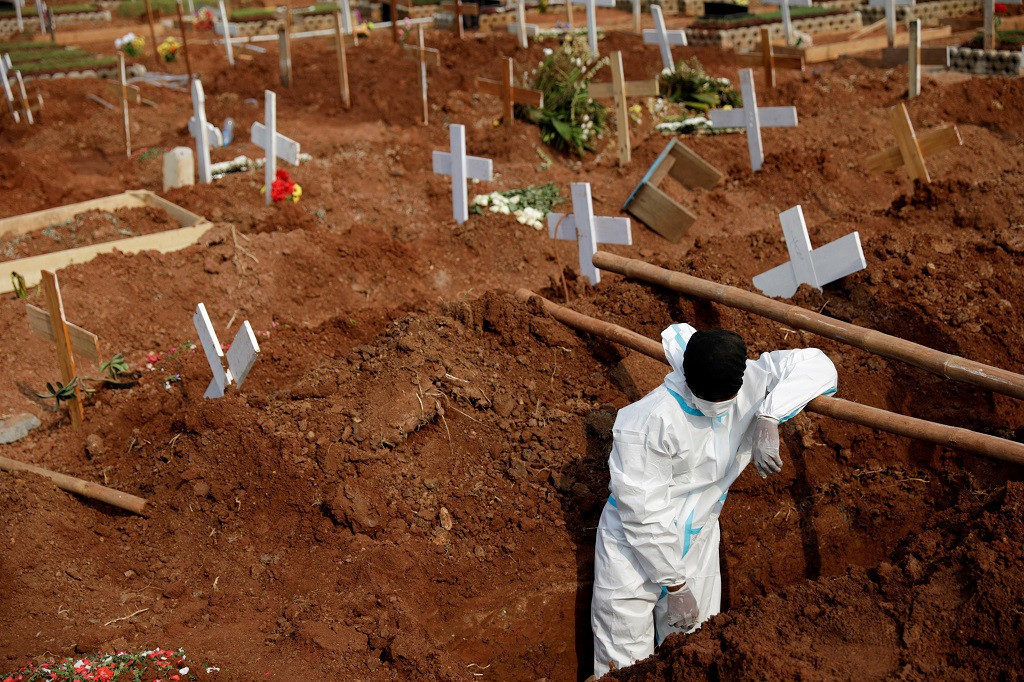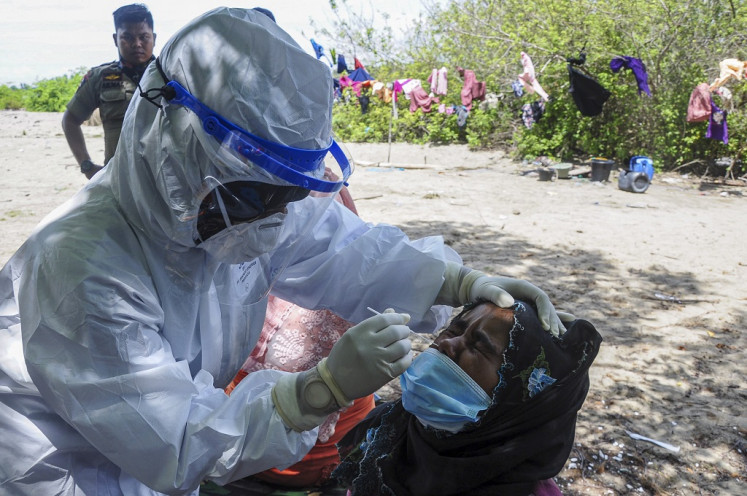Popular Reads
Top Results
Can't find what you're looking for?
View all search resultsPopular Reads
Top Results
Can't find what you're looking for?
View all search resultsRI braces for worst-case coronavirus scenario
Government yet to decide on PPKM Darurat extension
Change text size
Gift Premium Articles
to Anyone
T
he government is bracing for the worst-case scenario as the country battles the latest COVID-19 surge while hoping the situation will improve in the coming weeks, a senior minister has said.
In a live-streamed press briefing on Thursday, Coordinating Maritime Affairs and Investment Minister Luhut Pandjaitan said the government was preparing scenarios should the country see a further surge in confirmed COVID-19 cases.
“If we’re talking about 60,000 [new cases a day] or slightly higher than that, that’s still fine. We’re hoping that the figure won’t reach 100,000. But even if we get there, we’re preparing ourselves for the worst scenario,” Luhut said.
Indonesia has overtaken India as Asia’s new epicenter for the coronavirus pandemic, with daily infections exceeding 50,000 — up more than 10-fold on the number of cases in early June.
On Thursday, the Health Ministry confirmed 56,757 new cases, bringing a cumulative total of 2.72 million cases. Moreover, authorities recorded 982 new deaths on the same day, bringing the total tally for COVID-19 deaths in the country to 70,192.
To date, health authorities have recorded 480,199 active COVID-19 cases across the nation.
Read also: PPKM Darurat necessary for sustainable recovery in Indonesia
Luhut, who has been appointed to manage the COVID-19 restrictions in Indonesia’s two most populous islands of Java and Bali, said the Delta variant dominated in cases found across the two islands. He pointed out that several countries, such as the Netherlands and Malaysia, were also facing similar surges because of the variant.
Studies suggest that the variant, first found in India, is more transmissible compared with other discovered SARS-CoV-2 variants.
“It’s not easy to contain the Delta variant,” the minister said.
No PPKM Darurat extension?
The latest wave of the outbreak has heaped overwhelming pressure on healthcare facilities, with healthcare workers reportedly falling sick and losing their lives to the virus. Many hospitals across Java and Bali also report shortages of medical-grade oxygen, putting the lives of hundreds of thousands of COVID-19 patients on the line.
As the surge shows no signs of receding in the near future, pressure is piling on the government to extend the latest COVID-19 restrictions dubbed the emergency public activity restrictions (PPKM Darurat), which are due to expire next Tuesday.
The pressure has increased as the government has failed to meet the targets set when imposing the restrictions on July 3, such as ramping up COVID-19 testing.
To the test: An East Aceh Health Agency official takes a swab sample for a COVID-19 antigen test from a Rohingya refugee at a shelter on Idaman Island, Simpang Ulim district, East Aceh regency, Aceh, on June 9, 2021. Indonesians authorities are relocating 81 Rohingya refugees who arrived by boat on the shores of Aceh province to Medan, North Sumatra. (Antara/Hayaturrahmah)Health Minister Budi Gunadi Sadikin set a target of 400,000 tests each day during the restrictions. However, according to the official count, health authorities could only conduct around 135,000 rapid antigen and polymerase chain reaction (PCR) tests on a daily average between July 3 and Thursday.
The Health Ministry continues to record a positivity rate for PCR tests, the percentage of all PCR tests performed that come back positive, of more than 30 percent -- above the threshold recommended by the World Health Organization of “below 5 percent for at least two weeks before government considers reopening [restrictions].”
Read also: Indonesia’s static positivity rate highlights persisting gaps in testing capacity, capability
The government was reportedly considering extending the restrictions after Finance Minister Sri Mulyani Indrawati said during a meeting with the House of Representatives budget committee on Monday that a scenario had been prepared to impose the PPKM Darurat “for four to six weeks to curb the COVID-19 transmission.”
When asked on Thursday whether the government would extend the PPKM Darurat, Luhut answered that the government was carefully considering its decisions on the matter. He went on to say that President Joko “Jokowi” Widodo had asked him to evaluate the implementation of the restrictions.
“I promise [to announce] our decision based on the current situation,” he said.
More hospitals, health workers
Luhut added that the government would prepare for 60,000 daily cases in the near future by, among other measures, creating more isolation facilities and emergency hospitals.
The central government is converting several low-cost apartment buildings in Jakarta, one of the cities hardest hit by the outbreak, into isolation centers for patients with mild and moderate symptoms. It has also converted a haj dormitory in Pondok Gede, East Jakarta, into a COVID-19 emergency hospital.
Around 2,000 fresh graduates of medical schools and 20,000 nurses have been recruited to help treat COVID-19 patients in an attempt to deal with a shortage of medical workers.
Authorities have also imported medicines, medical equipment and medical-grade oxygen to mitigate shortages found in many regions across the nation amid the COVID-19 patient surge, the retired Army general added.
Read also: Delta variant overwhelms Indonesia’s beleaguered Puskesmas
Experts continue to urge the government to extend the restrictions, with epidemiologist Dicky Budiman from Australia’s Griffith University saying that “the worst has yet to come.”
“Despite not being the ideal [response], we need the PPKM Darurat to reduce the potential worst conditions,” he said.
Another epidemiologist Riris Andono Ahmad from Gadjah Mada University said public mobility was still too high during the PPKM Darurat period. “The only way to reduce case transmission is to curb mobility.”
He added that the government’s worst-case scenario would not be able to withstand further confirmed case surges without proper mobility restrictions.











